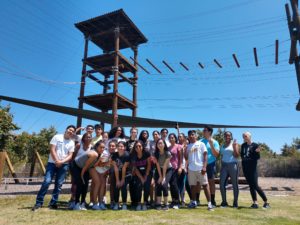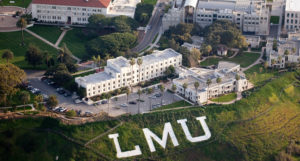INTERCULTURAL AFFAIRS | When you look at the above image, do you first notice all the blue dots or the three red dots? When there are very few distinctive elements in an otherwise similar field, they are highly salient in our perception, standing out like the red dots in the field of blue. In fact, it might even seem that they are clustered together more than the others. Are they really, or does it just look that way because they stand out?
In her classic book, “Why Are All The Black Kids Sitting Together in the Cafeteria?,” author and psychologist Beverly Daniel Tatum noted how simply being in the minority can make you more distinctive, more conspicuous to others than anyone else. This is one explanation for why it seems like those who are viewed as “minorities” — however defined in a particular context — are perceived as sticking together. It appears as though the red dots are close together, even as comparable blue dot clusters pass through our perceptual filters unnoticed, unremarkable for their commonality. In the same way, people can stick out in our perceptions and awareness by simply being part of a visible minority group.
This can lead to the feeling of being continually noticed and even scrutinized, which can be highly stressful, especially in a hostile environment. In his recent book, “Upending the Ivory Tower,” Professor Stefan Bradley, chair of our own African American Studies Department, describes the forced isolation of the first Black undergraduates at Princeton during its early years of desegregating after World War II. Bradley observes that these students, barred from having roommates and in unfamiliar and unwelcoming territory, “went through an experience that was painful and prolonged” (p. 57). Although such policies may no longer be in place, this example illustrates how a college campus may continue to represent a different sociocultural reality for many students.
While it is true that the first year of college represents a major transition for all students, it can be a much bigger cultural shift for some students compared with others. Programs that enable students of similar “minority” backgrounds to share these challenges and experiences can be really instrumental to their well-being, sense of belonging, and academic success. As such, these programs are critical to helping cultivate an inclusive campus climate. The red dots can find each other, just like the blue dots are more easily able to do. Students learn that they can take pride in their communities and family backgrounds, even as they learn to cope and support each other through the challenges of negotiating their college experiences. At LMU, we understand the needs of our students from underrepresented groups to find community, to build upon their strengths, and to push each other towards success. Thus, we take pride in our support services and specified programs:
- Ethnic and Intercultural Services (EIS) hosts eight culturally-driven programs focused on identity development, community building, and advocacy.
- Office for International Students and Scholars creates an engaged global community through programs and services that support international students’ and scholars’ social, educational, and professional success.
- Disability Support Services facilitates specialized assistance and resources to help self-identifying students with physical, perceptual, learning, ADHD, and/or psychological disabilities achieve maximum independence while pursuing their educational goals.
- McNair Scholars Program is designed for undergraduates who are either first-generation college students with financial need or members of a group that is traditionally underrepresented in graduate education. McNair prepares these students for doctoral studies through involvement in research and other scholarly activities.
- Academic Community of Excellence (ACE) prepares underrepresented students to pursue graduate and professional programs.
This month, we share our pride for these important programs with a particular focus on our ACE undergraduate students. Initially funded by the James Irvine Foundation, the Academic Community of Excellence began at LMU in fall 2004. By 2010, ACE was institutionalized and existed as a strategic initiative of the Office of Intercultural Affairs. This year marks the program’s 15th anniversary.

Through advising, residential and applied experiences, and tailored courses, ACE continues to support the graduate educational aspirations of diverse students. Students participate in cooperative research activities; sponsored trips to regional and national conferences; annual mixers with Career and Professional Development, faculty, and alumni; a research showcase; an alumni mentor program, and more. Students also develop an individualized action plan to enroll in a master’s or doctoral program. Notably, students discuss issues around higher educational access and diversity and the importance of service and civic engagement.
ACE students and alumni continue to thrive academically: 99% of ACE scholars who began as sophomores have graduated from LMU; 56% of alumni have enrolled in or completed programs at more than 45 master’s and doctorate-granting institutions. Students and alumni have secured prestigious awards and opportunities. For example, senior Phaedra Johnson was inducted into the LMU chapters of both Alpha Sigma Nu and Phi Beta Kappa Honor Societies, and alum Delphert Smith recently completed the California Senate Fellows Program. Also, participants of ACE have obtained or participated in the Barry Goldwater Scholarship, Rotary Ambassadorial Scholarship, Japan Exchange and Teaching Program, Gilman Scholarship, Teach For America, LMU Ignatian Award, and Presidential Citation. Through ACE’s services, opportunities, and the success of its scholars, the program continues to elevate the importance and attainability of a postgraduate degree for underrepresented students.
The resilience, determination, and passion of our students drives the work that we do. We are proud to share these stories and continue to uplift students to success and advancement. Particularly joyous are the stories of students who benefit from these programs, graduate, and go on to give back to their communities; promoting a cycle of inspiration, elevation, and enrichment. One of these stories, for instance, is about an alum who felt highly supported by his experience by EIS’ Chicano/a Latino/a Student Services as an undergraduate. He went on for his graduate studies and is now a professor at LMU and mentors other students – read about Professor Ernesto Colín here. Such testimonies provide evidence of the significant role played by intercultural programs for promoting the thriving of all members of our campus community.
Creating the world we want to live in: This is what we strive to do each day at LMU.
OIA Buzz
- Quote of the Month: “Any good teacher knows how important it is to connect with students and understand our culture.” – Adora Svitak
- Celebrate: Several LMU departments and divisions have taken impressive strides to increase their cultural awareness and enhance diversity & inclusion in their departments; particularly by requesting Search Process workshops on Faculty Recruitment & Hiring and participating in our Implicit Bias workshops. As a related initiative, OIA will be hosting “Restorative Justice Practices for an Inclusive Climate” workshops with CURes’ facilitator, Schoene Mahmood:
- For Administrative Leadership: Nov. 7, 2019, from 10 a.m. – noon in the VDA Family Suite
- For Department Chairs: Nov. 20, 2019, from 9 – 11 a.m. in the VDA Family Suite
- D&I Quick Tips: Helpful Principles in Fostering Inclusive Excellence
- The Office of Intercultural Affairs invites faculty to apply for a Course Transformation Grant. Course Transformation Grants are available to continuing tenured and tenure-track faculty who want to integrate substantive scholarship on issues of diversity, equity, and inclusion into upper-division courses in the major. The course must be required for all majors in the discipline or program. Email oia@lmu.edu for a grant application. Grant applications are due Nov. 1, 2019.
- Save the Date: ACE Research Showcase Nov. 18 | 4:30-6 p.m. | McIntosh Center




